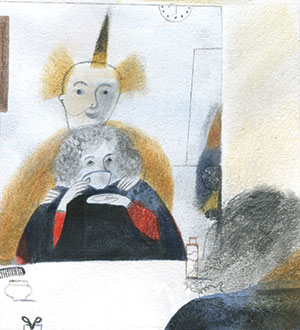The Shrink & The Sage: Who should we trust?
Roula Khalaf, Editor of the FT, selects her favourite stories in this weekly newsletter.
The Shrink
I have found that on the spectrum between trust and suspicion, people tend to veer very much towards the ends. Maybe it’s because we hate uncertainty that we try to eliminate it, assuming that people are really only interested in looking after number one or, conversely, that everybody is good at heart. I think most people err on one side or the other, whether they have a fully formed philosophy or just nurture vague assumptions.
Deciding who to trust is a complex and far from foolproof business. The first thing to recognise is that there is no “one size fits all” for human nature. Some people are genuinely honest and altruistic, and some – for whatever reason – are ready to take advantage of others and trample over their feelings.
One alternative to generalisations is to rely on our gut instinct and decide on a case-by-case basis. But there is a lot of research that suggests we overestimate ourselves as good judges of character. We are quite bad at detecting lying, for instance, a weakness that confidence tricksters regularly exploit.

Perhaps it’s best to adopt a mixed approach. It’s worth paying attention to gut feelings, with the awareness that they’re not infallible and might reflect prejudice rather than reality. At the same time, since we don’t want to spend too much mental energy assessing particular individuals, some simple heuristics can come in handy, such as the gambling rule that we shouldn’t risk what we can’t afford to lose. And it’s always useful to reflect on past experience: if we’re finding ourselves let down all the time, does that mean we’re being too trusting?
A jaundiced attitude can be as problematic as being too ready to trust, creating an atmosphere of suspicion. Trusting people, on the other hand, can evoke in them the desire to live up to expectations. Unless we have good reason to do otherwise it seems sensible to make trust the default. Sure, sometimes we’ll be let down but that’s the price we have to pay.
…
The Sage
Descartes was appealing to nothing grander than common sense when he said, “It is prudent never to trust completely those who have deceived us even once.” He soon departed from received wisdom, however, when he applied this maxim to our senses, concluding that we can’t even trust the evidence of our own eyes.
This follows the archetypal philosophical progression that Bertrand Russell famously described as from “something so simple as not to seem worth stating” to “something so paradoxical that no one will believe it”. It also supports the stereotype of the philosopher as someone whose motto is “trust no one, doubt everything”.
This might look less like the path to enlightenment and more like a recipe for cynicism and paranoia. But I think this distrust of trust is entirely constructive, when rightly understood and applied.
First and foremost, it has to be understood that philosophical mistrust is nothing personal. The failure to appreciate this is the bane of my life. When someone tells me something, I want to know why they believe it. People seem to take this kind of questioning as an insult, as though I doubt their honesty. But I am not impugning their moral character. I’m simply aware that people make many honest mistakes, often because they are in a sense too nice and have been too quick to believe what they have read or been told. Similarly, I also know that good intentions are not always enough to ensure people do what they sincerely want to do.
The reason none of this adds up to corrosive cynicism is that it is not based on suspicion of others but on a recognition of human frailty. Hence the philosophic soul trusts herself no more and no less than she does anyone else. None of us can trust that our memories, our reasoning or our intentions guarantee the truth or goodness of what they produce. We need to check, verify and monitor. If we do this in the right spirit, the result is not bitterness but compassion for ourselves and others, a sympathetic acceptance that all of us are bound to err.
The Shrink & The Sage live together in southwest England
To suggest a question, email shrinkandsage@shrinkandsage.com
Illustration by Laura Carlin
Comments